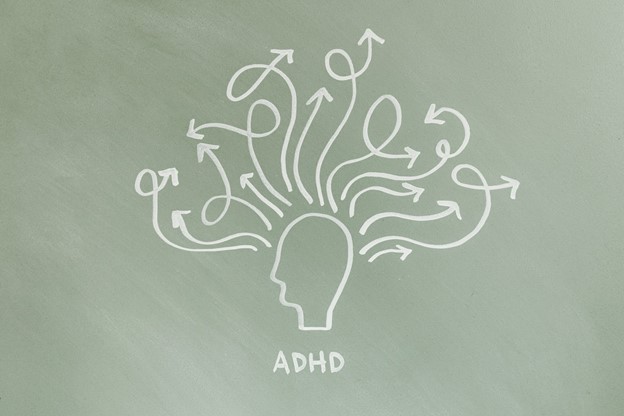Adults can also be diagnosed with Attention Deficit Hyperactivity Disorder (ADHD). They may have had the disorder as children and went undetected, or their symptoms may have gotten worse over time. Moreover, adults can have signs of ADHD that are less visible than symptoms in youngsters. Those with ADHD may exhibit primary symptoms such as restlessness, impulsivity, and difficulties focusing.
Those with ADHD may struggle with concentration, task prioritization, recalling directions and information, and finishing projects on time. These symptoms can emerge in various ways, including persistent procrastination, mood swings, ineffective time management, and low self-esteem. They can even result in difficulties at work, school, and relationships.
Strategies in Managing Adult ADHD
Everything keeps you overwhelmed if you have ADHD, yet it is possible to manage ADHD symptoms, regain focus, and transform chaos into serenity. You may increase your productivity and sense of self-worth by implementing these strategies.
Be In Control And Organized
Organizing is likely the most challenging thing individuals with ADHD encounter due to the disorder’s characteristics of inattention and distractibility. If you have adult ADHD, the notion of organizing your activities, whether at work or home, may overwhelm you. However, you can develop the ability to break jobs down into smaller pieces and systematically organize them.
You can maintain organization and control clutter by employing various structures and routines and utilizing daily planners and reminders. To organize a room, home, or business, organize your belongings by categorizing them and determining which are essential and may be kept or disposed of.
To stay organized, develop the practice of taking notes and creating lists. Regular activities can help you maintain your newly organized structure.
Time Management
ADHD is frequently associated with difficulties with time management. You may find yourself losing track of time regularly, procrastinating, missing deadlines, underestimating the amount of time required for tasks, or performing things in the incorrect sequence. Many adults with ADHD spend so much time on a single task (known as “hyper-focusing”) that they neglect to complete any other tasks.
Although these challenges can leave you feeling annoyed and inadequate, as well as causing others to become impatient, some alternatives can assist you in better managing your time. Adults who have ADHD frequently have a distorted view of the passage of time. Use the oldest trick in the book: a clock to sync your sense of time.
Keep Track Of The Budget And Bills
Money management necessitates budget, planning, and organizing, which can be difficult for many adults with ADHD. Many conventional money management systems do not function well for adults with ADHD because they take too much time, too much paper, and detailed attention.
However, if you design your system that is both simple and consistent, you may get control of your finances and put an end to overspending, past-due payments, and fines for missing deadlines and deadline extensions.
Maintain Focus While at Work
ADHD can provide unique difficulties at work. The exact things you may find most challenging—organization, task completion, sitting still, and listening quietly—are the very things you are frequently asked to perform all day.
Balancing ADHD and a demanding job is not easy, but by customizing your work environment, you may maximize your strengths while limiting the negative impact of your ADHD symptoms. Begin by organizing your office, cubicle, or workstation in manageable steps.
A color-coding strategy can be quite beneficial for persons who have ADHD. Manage forgetfulness by keeping a written record of everything. Additionally, more critical jobs should be completed first. Establish deadlines for everything, even self-imposed ones.
Handle Stress And Boost Your Mood
Due to the disorganization and impulsivity that frequently accompany ADHD, adults who have it may deal with poor eating habits, irregular sleep patterns, or insufficient exercise—all of which can result in additional stress, bad moods, and a sense of having no control of their emotions. The most effective method to break this pattern is to take control of your lifestyle choices and establish new, healthy routines.
Eating healthfully and adhering to your physician’s prescribed medication can help you maintain your composure, avoid mood swings, and in many cases, combat anxiety and depression symptoms.
When it comes to medications such as Vyvanse maintenance, it’s important that you take them regularly. If budget is the concern, a discount or Vyvanse manufacturer coupon can help aid in the expenses.
Regular routines can help you feel more in control of your life. Working out is likely the most beneficial and efficient strategy to reduce hyperactivity and inattention associated with ADHD. Additionally, exercise can improve your mood, alleviate stress, and relax your mind, assisting in the expulsion of extra energy and aggression.
Final Thoughts
Adult ADHD is frequently underrecognized and underdiagnosed. However, there are efficient ways to control it by implementing beneficial strategies in the office, home, and other places. It is possible to diagnose the problem in individuals who come with symptoms when combined with appropriate therapy from an expert, which will help patients perform better at work and improve their overall quality of life.




